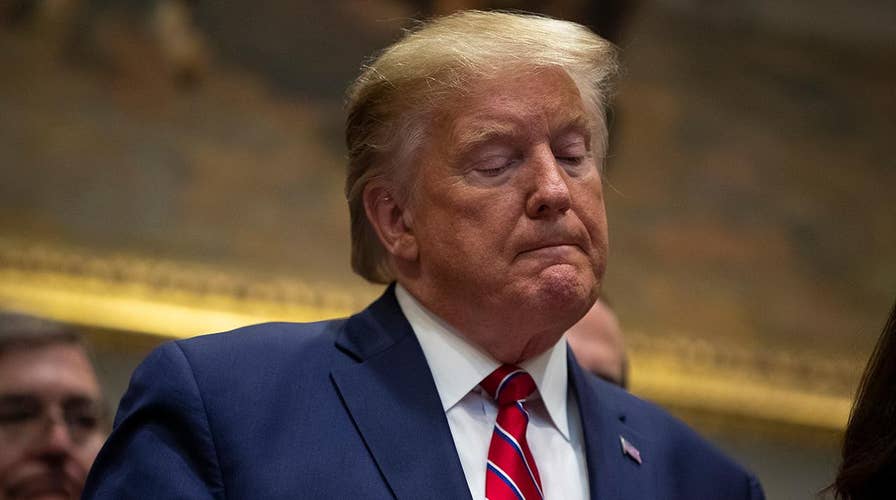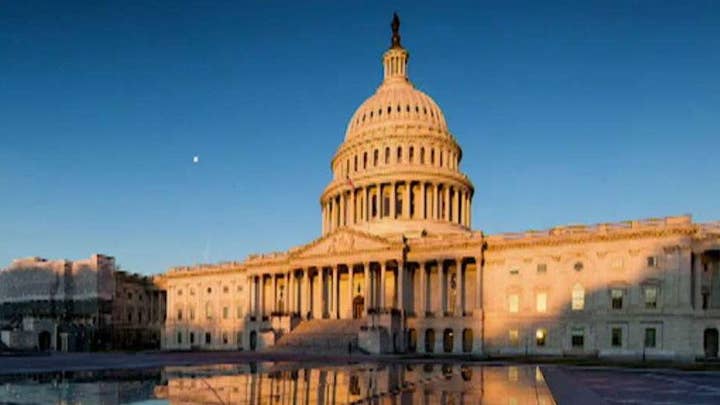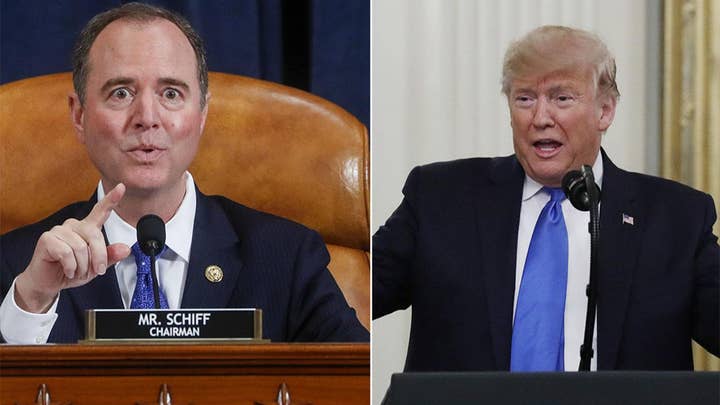Trump, supporters in Congress may be coming to terms with Senate impeachment trial
With impeachment all but a certainty in the House, leading Republicans agree with White House officials that there should be a full trial and not a motion to dismiss; Kevin Corke reports from the White House.
House Democrats are entering what may be the final phase of their impeachment inquiry, after wrapping up a spree of hearings where witnesses tied top officials -- including President Trump -- to efforts to pressure Ukraine on political investigations while military aid was being withheld.
But the tables could turn, should the House approve impeachment articles and trigger a trial in the Republican-controlled Senate. There, Trump’s allies are already indicating they will look more closely at allegations involving Democrats.
"Frankly, I want a trial," Trump declared Friday on “Fox & Friends.”
TRUMP CALLS FOR SENATE TRIAL, SEEKS WHISTLEBLOWER AND SCHIFF AS IMPEACHMENT WITNESSES
There’s a reason for that.
Democrats have controlled everything during marathon proceedings in the House, frustrating GOP attempts to call witnesses pertaining to the matters Trump wanted Ukraine to investigate -- specifically, the Bidens’ business dealings in that country and Kiev’s alleged interference in the 2016 election.
But that changes on the Senate side, where Republicans have the majority and Trump allies chair key committees. Already, they’ve signaled their interest in exploring issues that House Democrats glossed over during their hearings.
On Thursday, Senate Judiciary Committee Chairman Lindsey Graham, R-S.C., penned a letter to Secretary of State Mike Pompeo requesting the release of any documents related to contacts between former Vice President Joe Biden and former Ukrainian President Petro Poroshenko, and to a meeting between son Hunter Biden’s business partner and former Secretary of State John Kerry.
This pertains to questions surrounding the elder Biden’s role in pressing for the ouster of a Ukrainian prosecutor who had been investigating the natural gas firm Burisma, where Hunter Biden served on the board. Biden denies any wrongdoing, but Republicans have pressed for details throughout the impeachment process, in a bid to show that even though Trump’s pressure campaign on Kiev triggered the impeachment inquiry, his concern was legitimate.
On the House side, Republicans likewise encountered challenges digging into allegations of Ukraine interference in the 2016 election. While Trump has sought to press an unsupported theory that Ukraine was tied to Democratic National Committee hacking, GOP lawmakers have sought details on other issues that are more grounded in published reports -- like whether former DNC consultant Alexandra Chalupa was improperly digging up dirt on Trump campaign chairman Paul Manafort and others with Ukraine’s help at the time.
Democrats did not grant GOP requests to call Biden's son Hunter, Chalupa and others on the House side.
But while it’s unclear if Senate Republicans will at least attempt to call these and other witnesses, high-ranking members are showing their early interest in exploring the issues.
Aside from the Graham letter, Senate Homeland Security Committee Chairman Ron Johnson, R-Wisc., and Finance Committee Chairman Sen. Chuck Grassley, R-Iowa, have penned a letter to the head of the National Archives and Records Administration to request records of multiple White House meetings that took place in 2016 involving Obama administration officials, Ukrainian government representatives and Democratic National Committee officials.
GRAHAM DEMANDS DOCUMENTS ON UKRAINE, BIDENS, OBAMA ADMINISTRATION FROM 2016
Johnson and Grassley wrote that during a meeting in 2016, officials “brought up investigations relating to Burisma Holdings.” The senators added that a Ukrainian political officer working in the Ukraine Embassy in Washington said U.S. officials in that meeting asked that "Kiev drop the Burisma probe and allow the FBI to take it over.”
They added that White House records revealed that Chalupa had attended “numerous meetings at the White House, including one event with President Obama.”
The new requests from Senate Republicans come as the House ended its series of scheduled hearings on Thursday. The Intelligence Committee could announce additional hearings and depositions, but at this time, nothing has been scheduled.
The committee may now write and transmit its report to the House Judiciary Committee, which could begin writing articles of impeachment ahead of a floor vote.
“What the House ends up passing will drive a lot of what we end up doing over here,” a senior Republican aide familiar with the ongoing discussions told Fox News Friday.
The aide told Fox News that the White House made a “positive” and “significant” development this week, as officials indicated “what they want” for the trial.
In the Senate trial, three separate parties have input to how it will play out: Senate Republicans, Senate Democrats and the White House.
“It is impossible for us to come up with contours for impeachment without input from the White House,” the aide said. “Their input is a very positive step so we can try to control this as much as possible.”
The White House, on Thursday, signaled that they would like a Senate trial to last no longer than two weeks. The impeachment of former President Bill Clinton lasted for six weeks.
“We all want speedy,” the aide said. “This is the first indication the White House has given and that’s a positive — before it was radio silence from them, and now they’re starting to indicate what they want this thing to look like.”
The aide explained that the Senate, once they receive articles of impeachment, will begin working on two resolutions — one that governs the timeline of the trial, and the other that sets up witnesses for closed-door depositions, as well as which witness will be required to testify on the stand.
The aide explained that the resolutions are “significant,” noting that they will “be the main avenue that evidence is admitted.”
The aide suggested that Republican senators like Graham, Grassley and Johnson could be attempting to help “shape” the witness list and the trial.
A senior administration official, though, claimed Friday there’s “ample reasons” for the Senate to simply dismiss the case – though GOP senators have indicated that’s unlikely to happen.
Yet the official still maintained it’s “100 percent to our advantage to have [a] full trial” in the Senate.
Meanwhile, Rep. Chris Stewart, R-Utah, said sending articles of impeachment to the Senate was "good news."
“Everyone knows what they’re going to do next. They’re going to impeach the president and send it onto the Senate, but that is the good news. That’s good news,” Stewart said. “In the U.S. Senate, there won’t be any secret testimony or dishonest leadership … or to deny a defense.”
He added: “So we’ll finally be able to get to the truth.”
Stewart went on to list several witnesses he hoped the Senate would call to testify, including the whistleblower, House Intelligence Committee Chairman Adam Schiff, Hunter Biden, Burisma board member Devon Archer, Chalupa, and Fusion GPS researcher Nellie Ohr.
And the president, himself, seems to be welcoming the trial as well.
“There’s nothing there,” Trump said Friday during an interview with “Fox & Friends,” saying “there should never be an impeachment,” and echoing GOP requests for the whistleblower, Schiff and Hunter Biden to appear as witnesses.
At the center of the impeachment inquiry, which began in September, is Trump’s July 25 phone call with Kiev. That call prompted the whistleblower complaint to the intelligence community inspector general, and in turn, the impeachment inquiry in the House. Trump challenged the accuracy of the complaint, though the transcript released by the White House did support the core allegations that he pressed for politically related investigations.
The president’s request came after millions in U.S. military aid to Ukraine had been frozen, which Democrats and witnesses have claimed shows a "quid pro quo" arrangement. Trump denies any wrongdoing.














































